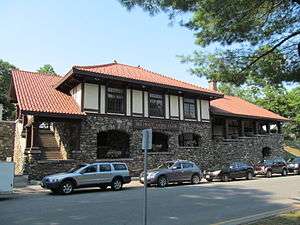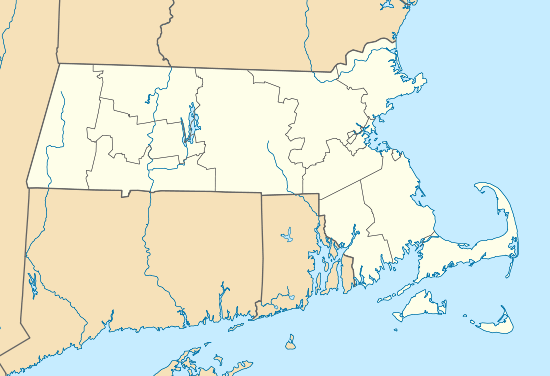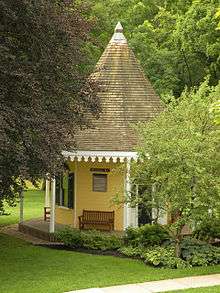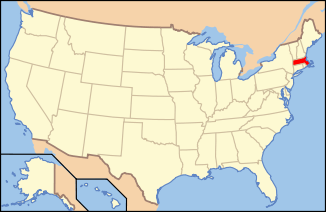Belmont Center station
BELMONT CENTER | |||||||||||
|---|---|---|---|---|---|---|---|---|---|---|---|
 Belmont Center station building, now the Belmont Lions Club | |||||||||||
| Location |
Common St & Concord Ave Belmont, Massachusetts 02478 | ||||||||||
| Coordinates | 42°23′45.3″N 71°10′34.3″W / 42.395917°N 71.176194°W | ||||||||||
| Line(s) | |||||||||||
| Platforms | 2 side platforms | ||||||||||
| Tracks | 2 | ||||||||||
| Connections |
| ||||||||||
| Construction | |||||||||||
| Parking | no spaces | ||||||||||
| Bicycle facilities | 8 spaces | ||||||||||
| Other information | |||||||||||
| Fare zone | 1 | ||||||||||
| History | |||||||||||
| Opened | 1852,[1] March 4, 1974[2] | ||||||||||
| Closed | 1958[2] | ||||||||||
| Rebuilt | c. 1879, c. 1908[3] | ||||||||||
| Traffic | |||||||||||
| Passengers (2013) | 168 (weekday inbound average)[4] | ||||||||||
| Services | |||||||||||
| |||||||||||
|
Belmont Railroad Station | |||||||||||
  | |||||||||||
| Location |
1 Common St Belmont, Massachusetts | ||||||||||
| Coordinates | 42°23′45″N 71°10′30″W / 42.39583°N 71.17500°WCoordinates: 42°23′45″N 71°10′30″W / 42.39583°N 71.17500°W | ||||||||||
| Built | 1908 | ||||||||||
| Architectural style | Bungalow/Craftsman[5] | ||||||||||
| NRHP reference # | 98001443[5] | ||||||||||
| Added to NRHP | December 4, 1998 | ||||||||||
Belmont Center is an MBTA Commuter Rail station in Belmont, Massachusetts. It serves the Fitchburg Line. It is situated at the intersection of Common Street, Concord Avenue, and Leonard Street adjacent to Belmont's town center. It is one of two railroad stations located in Belmont, the other being Waverley station located in Waverley Square. To avoid any potential confusion, the station is labeled as Belmont on MBTA maps.[6]
The modern station was built in 1908 after the completion of a grade separation project in which the railroad tracks were raised above grade. There are two low-level side platforms serving the line's two tracks on an elevated grade. The station has no high-level platforms or ramps and is therefore not handicapped accessible. The station does not have a ticket office or ticket vending machines, meaning passengers must purchase tickets on board the trains.
History
Early days

Wellington Hill station opened in 1852, with a former school building built the previous decade moved to the site for a depot.[1] A two-story wooden depot was built around 1879; the old station was moved and used as a summer house and an art studio at the Underwood Estate nearby. It was given to the Belmont Historical Society in 1975, and moved to its present location across the street from the modern station in 1980.[3]
Track elevation
To eliminate the busy grade crossing of Concord Avenue, the tracks through Belmont Center were raised in 1907. A massive two-story California Bungalow station was built from 365 tons of fieldstone quarried from Belmont Hill by a local farmer.[3] All service to Belmont Center and nearby Waverley ended in 1958.[2]
MBTA era and accessibility
Service to Belmont Center and Waverley resumed on March 4, 1974. The Central Mass Branch had been discontinued in 1971, so all service was on the South Acton (now Fitchburg) Line.[2] Weekend service was discontinued at the two stops on January 30, 1981 as part of general cutbacks, but restored on December 6, 1993.[2]
The 1908-built station building, which is now owned and occupied by the Belmont Lions Club, was added to the National Register of Historic Places on December 4, 1998.[3][5][7]
As part of budget cuts, the MBTA was considering an option to shutter the current Belmont station as well as Waverley station and build a new stop in between.[8][9][10] Plans to combine both stations have been outlined in previous studies as early as 2005. Such works as Fitchburg Commuter Rail Line Improvement Implementation Plan, released in September 2005 have considered this plan.[11] However, plans for a new station were dropped in January 2016.[12] As of August 2017, there are no active plans to upgrade Belmont Center and make it ADA-accessible.
Bus connections
Two MBTA Bus routes serve Belmont Center on weekdays and Saturday:
- 74 Belmont Center - Harvard Station via Concord Avenue
- 75 Belmont Center - Harvard Station via Concord Avenue
On Sundays, the 72, 74, and 75 routes are combined into the 72/75 route, which runs on segments of all three routes from Harvard to Belmont.
See also
References
- 1 2 "What We Do". Belmont Historical Society. Retrieved 1 June 2014.
- 1 2 3 4 5 Belcher, Jonathan (22 March 2014). "Changes to Transit Service in the MBTA district" (PDF). NETransit. Retrieved 1 June 2014.
- 1 2 3 4 Roy, John H. Jr. (2007). A Field Guide to Southern New England Railroad Depots and Freight Houses. Branch Line Press. p. 132. ISBN 9780942147087.
- ↑ "Ridership and Service Statistics" (PDF) (14th ed.). Massachusetts Bay Transportation Authority. 2014.
- 1 2 3 National Park Service (2010-07-09). "National Register Information System". National Register of Historic Places. National Park Service.
- ↑ "MBTA Commuter Rail Map". MBTA. Retrieved 2015-09-16.
- ↑ "Belmont Lions Club". Town of Belmont. Archived from the original on 23 October 2007. Retrieved 2007-11-11.
- ↑ TUCKER, FRANKLIN (February 29, 2012). "MBTA Cuts Will Go Deep Into Belmont". Belmont Patch. Retrieved September 17, 2015.
- ↑ Berkowitz, Bram (September 17, 2015). "Belmont could be home to new MBTA station". Gatehouse Media, LLC. Wicked Local. Retrieved September 17, 2015.
- ↑ TUCKER, FRANKLIN B. (September 16, 2015). "Belmont Could See One, Both MBTA Commuter Stations Closed In Favor of New Stop". The Belmontonian. Retrieved September 17, 2015.
- ↑ "MBTA Commuter Rail Fitchburg Branch Improvements". Fitchburg Commuter Rail Line Improvement Implementation Plan. Massachusetts Bay Transportation Authority. September 2005. Archived from the original on 29 January 2014. Retrieved 29 January 2014.
- ↑ "MBTA rejects new Belmont station". Belmontian. January 22, 2016. Retrieved August 10, 2017.
External links
| Wikimedia Commons has media related to Belmont Center (MBTA station). |
